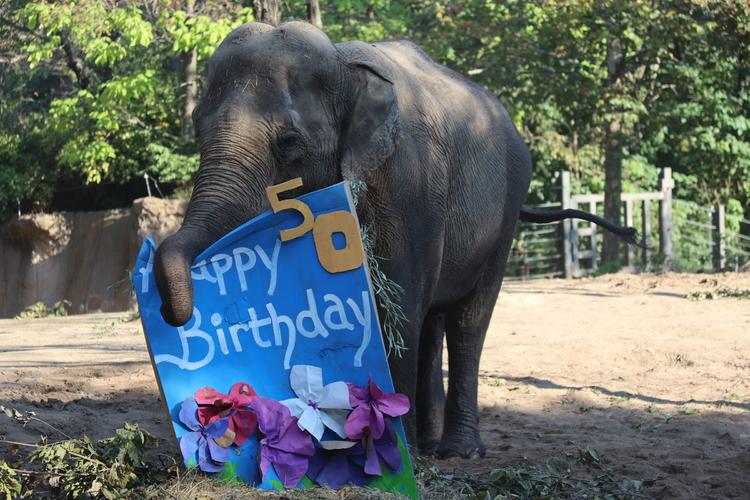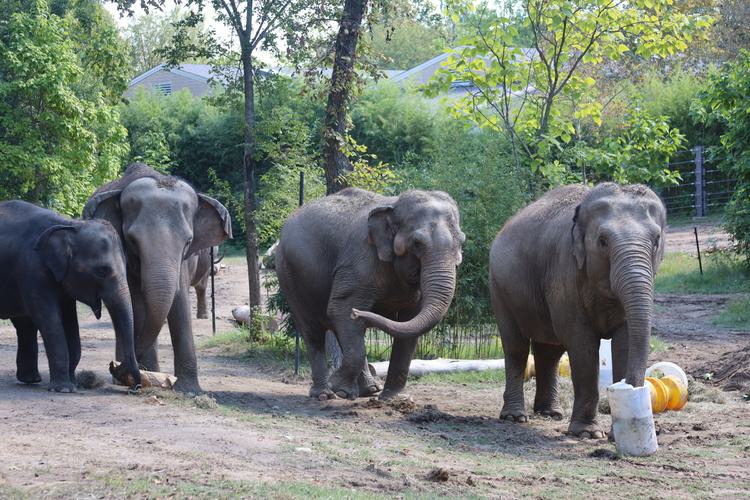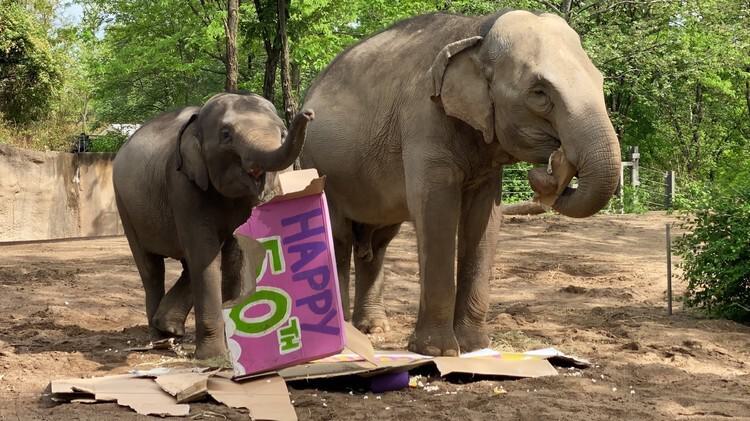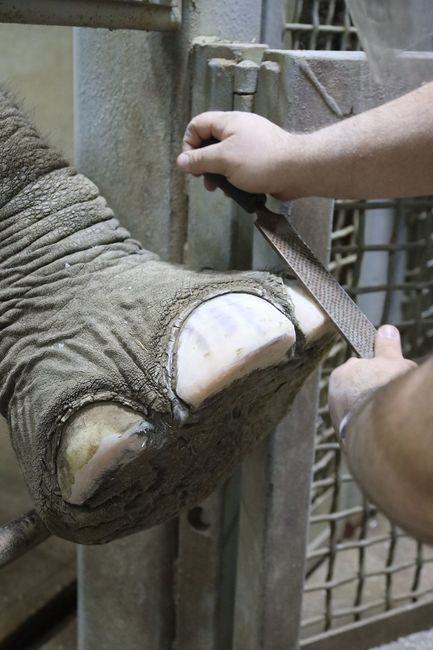
Pearl is one of the three elephants at the Zoo that turned 50 in 2021. She interacted with her Happy Birthday sign, which was one part of her birthday celebration. Credit: Saint Louis Zoo.
I’m Becky Heisler, a keeper in the River’s Edge of the Saint Louis Zoo. My passion for elephants began in graduate school, where I studied with an elephant reproductive specialist. From there, I began my career at the Zoo as a River’s Edge keeper and have been in this position ever since. I’ve spent the past 19 years learning the intricacies of our elephant family’s personalities and forming bonds with this exceptional herd. As you can imagine, after almost two decades in this career, I’m starting to age a bit. Not unlike their aging keeper, some of our elephants are feeling the normal effects of getting older. This year we are celebrating the 50th birthdays of Pearl, Donna and Ellie, three elderly Asian elephants that call the Zoo home. The median life expectancy for Asian elephant females under human care is 47.5 years old. At 50 years old, our “Golden Girls” are considered geriatric, and we expect them to require medical care specialized for their dynamic and individual needs beyond primary care for the rest of their lives.
Before I dive into how we help our older elephants, I want to introduce each of them! Each elephant is different with her own unique personality and fun interests.

Priya, Ellie, Donna and Sri (from left to right) are seen interacting with several enrichment items including hay filled paper bags, large elephant-sized popsicles in white barrels and large, heavy-duty rubber toys. Ellie and Donna each turned 50 in 2021. They are considered geriatric elephants and are given unique care at the Zoo. Credit: Saint Louis Zoo
Pearl was the first female elephant to give birth at the Zoo, and she is the mother of our bull elephant Raja. Pearl has the most captivating golden eyes and likes to spend time with her granddaughters, Maliha, Jade, and Priya. She is very attentive and seems to enjoy interacting with her keepers. A good problem solver, she loves challenging puzzle feeders filled with special treats.
Donna has distinctive, flappy ears that are always moving! She is very conversational (oh, the stories she tells with her rumbles!) and enjoys making sounds with her trunk on various objects (a sort of ‘thunk, thunk, thunk’). A fantastic auntie, she used to spar with a much younger Raja. Nowadays, she helps teach Raja’s kids manners, such as sharing food and respecting elders. It’s important for young elephants to learn how to live well in a social group of dominant females, and Donna is a great teacher!
Ellie is a doting mother of three, a grandmother and our tallest female. She has a calm demeanor and does life by her own schedule. She enjoys pruning our trees and chilling in one of the pools under the waterfall.

Ellie (right) is one of the three elephants at the Zoo that turned 50 in 2021. Her youngest daughter Priya (left) helped her enjoy her birthday celebration. Credit: Saint Louis Zoo
These "Golden Girls" are in need of increased support due to their age. Just like many people, they require geriatric care throughout the day. While I am reluctant to start my own exercise routine, these cooperative elephants voluntarily participate in daily exercises. The elephant care team that I am a part of helps them focus on stretching and staying limber through activities like yoga for elephants. Since joint health and mobility are so important, we design exercise routines to make sure they are able to perform movements properly with no discomfort.
Just as I need a yearly check-up, Pearl, Donna and Ellie also need health evaluations. Our extraordinary Animal Health and Nutrition teams provide a unified approach to ensure optimal well-being. They oversee physical exams twice a year. During these appointments, we check the elephants’ eyes, teeth, feet, and general movement. The team may discuss the addition of medications and supplements as necessary. This is all in addition to body condition assessments that take into account a number of health data points. We analyze this rating multiple times a year to verify the girls are fit and maintaining a healthy weight.
Health is not only about physical comfort; scientific studies on zoo elephant welfare suggest elephants experience the highest level of well-being when they live in a multigenerational family. We provide this exact type of social environment for our elephants and give them the opportunity to spend time with the younger individuals. This is why guests will often see Pearl with Maliha and Jade, and Donna and Sri with Ellie and her daughters. But most importantly, they have ample space to engage or disengage with individuals as they choose. Sometimes, these older ladies prefer some time away from the energetic youngsters. We can all relate to that! I feel this at a personal level, as I just attended a moms’ weekend away for “me time” at a spa. We definitely provide “me time” for the elephants as needed and are happy to give elephant pedicures or baths.

The elephants at the Zoo receive detailed health care, including nail trimmings. Nail care is important because properly trimmed nails can help to even out weight distribution on the cushiony pads of their feet and help prevent nail overgrowth and cracking. Credit: Saint Louis Zoo
The animal care team plays a key role in the care of these geriatric ladies. We are with them daily and intimately know them, which allows us to quickly notice if one of our elephants is acting uncharacteristically. Furthermore, we are knowledgeable about issues that are common in geriatric elephants and so have taken a number of preventative measures to help ease them into old age.
As foot problems can occur in older elephants, we condition the soil of the habitats to create a softer walking surface and provide checkups on their feet that include keeping their nails healthy and trimmed. Elephants have six sets of four teeth and, uniquely among mammals, even their permanent molars will be continuously replaced throughout their lifetime. To help provide these girls’ exceptional dental care, we offer a variety of plant material to browse on including soft trees, like willow! We also help grow and maintain a lush natural environment, so that each elephant develops their own favorite way to enjoy the River’s Edge.
In addition to dynamic social groups and habitats, we provide mental stimulation by creating positive-keeper elephant relationships that allow for voluntary and enriching training programs tailored to each elephant’s interests. They are active participants in their own preventative health care routines, so that if there is ever an illness or emergency requiring immediate intervention, this positive reinforcement training will remove a level of stress on the animals.
The elephant care team will continue to provide preventative measures for the entire elephant family, including our "Golden Girls." I hope to be a part of this extraordinary team for several more years and may even become inspired to monitor my own health the way we monitor the elephants’ and replace my fast food tacos with kale! The Zoo provides exceptional elephant care by creating a low-stress, enriching environment with tailored diets and exercise programs. All of these factors are incorporated into the elephants’ daily voluntary routines. We want our elephant (and keeper!) family to live a long, healthy and comfortable life at the Zoo, no matter their stage of life!

